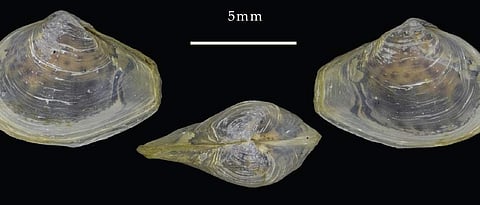Cusat researchers discover new genus of clam in Kochi backwaters
KOCHI: A team of researchers from the Cusat School of Marine Sciences, National Museum of Wales, UK, and the Australian Museum Research Institute has discovered a new genus of clam and a new species of bivalve clam, an aquatic mollusc which has a compressed body enclosed within a hinged shell.
The team relocated three small bivalve clams - Corbula, Cuspidaria, and Sphenia - described by H B Preston in a new genus ‘Indosphenia’ by molecular and morpho taxonomic data. Molecular and morphological data indicate this group belongs to the family Myidae.
“The combined data suggests these Indian myids are a sister taxon of the genus Sphenia. We also found a new species Indosphenia kayalum in Kochi’s backwaters. The specific name kayalum has been given to indicate ‘kayal’, our backwaters. The present naming is to make people aware of the ecological importance of our complex backwater ecosystems for conservation of our endemic fauna.
The other species recognised under the new genus are Indosphenia cochinensis, I. abbreviata, I. abbreviata chilkaensis and I. sowerbyi,” said Cusat department of marine biology head S Bijoy Nandan.The team of researchers included Graham Oliver from the Wales museum, Anders Hallan of the Australian institute and Cusat researchers P R Jayachandran, Philomina Joseph, V F Sanu and S Bijoy Nandan. The report was published in science journal ‘ZooKeys’ recently.
India supports extensive bivalve fisheries, notably mussels, oysters, and clams, with an estimated annual production of 84,483 tonnes. Clams form a subsistence fishery in Indian coastal waters, lakes, and estuaries, with a potential yield of 1.13 lakh tonnes.
“Our coastal backwaters have a wealth of unknown species of bivalve clams and understanding the status of the genus will help to develop a biodiversity repository. Bivalves have a significant role in maintaining the ecology as they clean pollutants.
They are called bioengineers as they recycle organic matter and aerate the soil. The black clams in our backwaters have been overexploited due to degradation of the ecosystem, land reclamation, pollution and mining,” said Bijoy.

